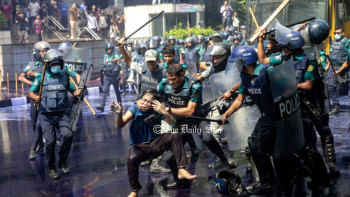Fortify Rights calls for reparations, transparency in enforced disappearance cases

On the first anniversary of Bangladesh's Commission of Inquiry on Enforced Disappearances, rights group Fortify Rights has called on the interim government to ensure accountability for past abuses and provide reparations to survivors and families of the disappeared.
"Enforced disappearances were a hallmark of former prime minister Sheikh Hasina's despotic rule, and should never be allowed to happen again in Bangladesh," said John Quinley, director at Fortify Rights, in a statement today.
The independent commission, established in August 2024, has received more than 1,800 complaints so far. Its early findings acknowledged that enforced disappearances were systematic and "orchestrated by a central command structure" during Hasina's tenure. While some victims have been released, hundreds remain missing.
Fortify Rights highlighted the harrowing accounts of survivors and documented testimonies from families still searching for loved ones.
Ayesha Ali, the mother of BNP activist Abdul Kader Masum, recounted the last phone call from her son in 2013. He has never been seen since.
Similarly, the daughter of student activist Kawsar Hossain, missing since 2013, said: "I want to hold my father's hand. I want to call my father Baba. … As his daughter, I deserve the truth."
Civil society groups like Maayer Daak, founded by relatives of the disappeared, have long demanded truth, justice, and reparations.
"The security forces picked up, detained, tortured, and killed the opposition. There were many forces involved, all the way to the top," said Maayer Daak co-founder Sanjida Islam Tulee.
Bangladesh ratified the International Convention for the Protection of All Persons from Enforced Disappearance in 2024, and the government has since drafted a prevention and redress ordinance.
However, Fortify Rights warned that provisions allowing the death penalty and trials in absentia undermine international standards.
The group urged the government to instead focus on a robust reparations program, effective remedies for victims, and dismantling abusive security structures.
"True accountability requires a victim-centered reparations program, fair justice procedures, and unwavering transparency," Quinley said.

 For all latest news, follow The Daily Star's Google News channel.
For all latest news, follow The Daily Star's Google News channel. 



Comments